|
|
|
Sort Order |
|
|
|
Items / Page
|
|
|
|
|
|
|
| Srl | Item |
| 1 |
ID:
192005
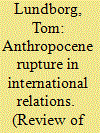

|
|
|
|
|
| Summary/Abstract |
The Anthropocene rupture refers to the beginning of our current geological epoch in which humans constitute a collective geological force that alters the trajectory of the Earth system. An increased engagement with this notion of a rupture has prompted a lively debate on the inherent anthropocentrism of International Relations (IR), and whether it is possible to transform it into something new that embraces diverse forms of existence, human as well as non-human. This article challenges that possibility. It shows how much of the current debate rests on the idea fulfilling future desirable ideals, which are pushed perpetually beyond a horizon of human thought, making them unreachable. As an alternative, the article turns to Jacques Derrida's understanding of the future to come (l'avenir), highlighting the significance of unpredictability and unexpected events. This understanding of the future shows how life within and of the international rests on encounters with the future as something radically other. On this basis, it is argued that responding to our current predicament should proceed not by seeking to fulfil future ideals but by encountering the future as incalculable and other, whose arrival represents an opportunity as much as a threat to established forms of international life.
|
|
|
|
|
|
|
|
|
|
|
|
|
|
|
|
| 2 |
ID:
192008
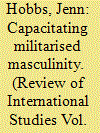

|
|
|
|
|
| Summary/Abstract |
This article examines the soldiering body in relation to the increasing prevalence of genitourinary injuries in military personnel. Feminist scholars have demonstrated that the idealised masculine soldiering body are central to the workings of international politics. The article shows that US militarised masculinity operates through the selective distribution of bodily capacities. The article draws upon critical disability studies, particularly Jasbir Puar's work on capacity and debility, to argue that treatments for genitourinary injuries revolve around the production of seminal capacity. Queer and trans bodies are debilitated in these arrangements through the denial of heterosexual and cisgender capabilities to them. To unpack this argument the article analyses treatments for genitourinary injuries. The article shows that genitourinary injuries destabilise the gender identity of US service members. Through an exploration of surgical treatments, including penis transplants and reconstructive surgeries, and fertility treatments, the article shows how masculine capacitation is achieved for some US service members through the debilitation of others; in particular, queer and trans bodies, and the bodies of Iraqi and Afghan civilians.
|
|
|
|
|
|
|
|
|
|
|
|
|
|
|
|
| 3 |
ID:
192009
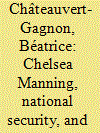

|
|
|
|
|
| Summary/Abstract |
‘I feel like a monster’, typed Chelsea Manning, referring partly to her gender identity but mostly to her job in the US military. Morally conflicted by what she saw and read while serving in Iraq, extremely isolated from her unit and experiencing emotional distress in relation to her gender identity, Manning would act on these stressors by leaking hundreds of documents to Wikileaks, and coming out as a (trans) woman. While she was quick to be classified as either a hero or a traitor, her case evades such dichotomisation and calls for more sophisticated readings. While a lot has been written on Manning in queer and transgender studies, surprisingly little has been published on this case in International Relations, not even in the quickly growing field of Queer IR. Yet Manning’s case helps highlight many of its core concerns in relation to issues of power, security, and sovereignty. In fact, what is often lost when reading the Manning case are the queer and trans logics of protection that were disrupted by Manning’s disclosures and that made such disruption possible. These dominant logics rely upon a culture of secrecy that must be preserved for performances of national security to hold true.
|
|
|
|
|
|
|
|
|
|
|
|
|
|
|
|
| 4 |
ID:
192006


|
|
|
|
|
| Summary/Abstract |
‘Follow the money’ is currently the central principle of international financial security, although money itself is probably one of the most unlikely objects to make traceable. Two recent scandals around a security unit and the payment processor Wirecard show how existing systems of financial surveillance that seek to capture ‘flows’ of money for security purposes are either enabled or frustrated. While this current regime of financial surveillance adheres to demanding the free flow of money through financial infrastructures and various actors and intermediaries, new digital currencies build on a set type of ledger(s) in which money is stored as data. Hence, what we understand as money does not ‘flow’, but is rather updated. This change in the underlying infrastructure means that traceability does not need to be enacted; it is an intrinsic feature of digital currencies. With new central bank digital currencies (CBDC), the regime of financial security thus changes from the monitoring of financial flows and flagging of (potentially) illicit transactions towards the storage of financial data in (de)centralised ledgers. This form of transactional governance is engendered by shifting geopolitical agendas that increasingly rely on fractured instead of globalised financial infrastructures, thus making CBDCs themselves subject to security efforts.
|
|
|
|
|
|
|
|
|
|
|
|
|
|
|
|
| 5 |
ID:
192013
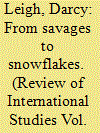

|
|
|
|
|
| Summary/Abstract |
Right-wing free speech advocacy is increasingly shaping global politics. In IR, free speech has generally been viewed within human rights and international legal frameworks. However, this article shows that contemporary free speech advocates often ignore or oppose human rights and international law, focusing instead on (what they describe as) a defence of the nation state against the enemies of free speech. This article examines this articulation of free speech's enemies: first historically as the ‘savage’ in John Stuart Mill's influential formulation of free speech; and then contemporarily as the ‘snowflake’, ‘mob’, and ‘cultural Marxist’ by elected officials and lobbyists in the UK and US. The article argues that John Stuart Mill's savage is figured within a racialised civilisational hierarchy of degrees of humanity. Today, right-wing free speech advocates extend and reconfigure this hierarchy, imagining the ‘snowflake’, ‘mob’, and ‘cultural Marxist’ as lesser human, subhuman, and extra-human, respectively. Thus, in contrast to rights-based analyses of free speech advocacy – which assume or assess the promotion of rights as a ‘public good’ – the article argues that narratives of free speech's enemies are deployed by right-wing free speech advocates to underwrite racialised policy responses and global hierarchies.
|
|
|
|
|
|
|
|
|
|
|
|
|
|
|
|
| 6 |
ID:
192010


|
|
|
|
|
| Summary/Abstract |
This article brings an intimate perspective to bear upon the violence of economic sanctions, shifting attention away from an exclusive focus on state actors, in order to examine how “‘wounds” enter politics’.1 In this research, I ‘stretch’ Berlant’s notion of the intimate public, reconfiguring it as a decolonial analytic lens on subaltern suffering in conditions of endemic imperial violence. I focus on the Facebook page of the Iranian chief negotiator, Javad Zarif, during Iran’s talks with the P5+1 powers over its nuclear programme, under the pressure of what the Obama administration itself termed ‘crippling’ economic sanctions. Examining Zarif’s audience’s readings of his back injury during the talks as representing the ‘crippled’ nation, I trace how subaltern injury is intimately narrated through a racialised framework of disablement and ‘recovery’, where ‘recovery’ signifies a desanctioned and deracialised national body. I firstly complicate the prevailing conception of the intimate public as oriented around a ‘national fantasy’, theorising it as an affective structure that simultaneously locates imperial power, as well as the nation-state, as sources of complaint and hope; secondly, I draw on a critical disability (‘crip’) lens to understand the intimate public as mediating both the debilitation of racialised underdevelopment, and the fantasy of a normative, ‘developed’ national body in a post-sanctions future. Through examining the intimate politics of economic sanctions, this study contributes to a decolonial perspective on the entanglements of affect, nationalism and imperial violence.
|
|
|
|
|
|
|
|
|
|
|
|
|
|
|
|
| 7 |
ID:
192012
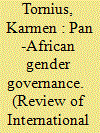

|
|
|
|
|
| Summary/Abstract |
The African Union (AU) has developed an elaborate gender governance architecture, including gender machineries and women’s desks, policy frameworks, path-breaking women’s rights laws, and ongoing campaigns on women’s rights–related issues. At the same time, the member states’ engagement with this architecture is at best lukewarm, with a lack of domestication, compliance, and accountability. This paradox is addressed in this article by developing the theoretical thinking around aspirational politics (Martha Finnemore and Michelle Jurkovich, ‘The politics of aspiration’, International Studies Quarterly, 64:4 [2020], pp. 759–69) and political brokers (Stacie E. Goddard, ‘Brokering change: Networks and entrepreneurs in international politics’, International Theory, 1:2 [2009], pp. 249–81), showing the social and relational origins of pan-African gender governance. In doing so, the article examines how ‘aspirational politics’ can be operationalized to examine the sociocultural and political production of shared future imaginaries. The paper focuses on AU femocrats as the key actors for AU’s aspirational gender agenda and argues for their importance as political brokers between AU member states, donors, UN agencies, and civil society organisations. By mobilizing actors and facilitating common ground and agreement, their institutionalized broker position allowed for various political entrepreneurs to emerge and thrive. At the same time, their pursuits are met with ‘aspirational fatigue’ or outright contestation by the member states. The case of the AU demonstrates how aspirational politics is not a ‘phase’ leading to norms governance but part and parcel of normative negotiation and engagement.
|
|
|
|
|
|
|
|
|
|
|
|
|
|
|
|
| 8 |
ID:
192007
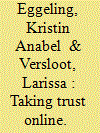

|
|
|
|
|
| Summary/Abstract |
Can trust – a core element of diplomacy – be taken online and if so, how? This article starts form the concern that trust is tied to face-to-face diplomacy, which is challenged in digitalising settings. We adopt a practice theoretical lens and study diplomatic information sharing in the Council of the European Union. Drawing on fieldwork from 2018–2021, we find that digital tools are indispensable for trust's enactment and, contrary to commonly held assumptions, do not negatively impede diplomatic trust, per se. Theorising from how diplomats handle digital tools, we find that this leads to a renegotiation of the place and boundaries of trust in diplomatic work. First, we show how digital tools create both new opportunities for and challenges to diplomatic trust, though these opportunities are more accessible to some than others. Second, whereas trust is taken online, it is not easily built digitally. Third, digital tools lead to a rearticulation of the place of transparency and confidentiality in diplomatic negotiations. It pushes diplomats to reconsider what it means to share information in an (un)trustworthy manner. Altogether, these findings further our understanding of contemporary diplomatic practice and offer a refined conception of diplomatic trust.
|
|
|
|
|
|
|
|
|
|
|
|
|
|
|
|
| 9 |
ID:
192011


|
|
|
|
|
| Summary/Abstract |
Scholars have studied how women’s domestic and transnational civil society activism addresses the gendered nature of transitional justice. In contrast, they have paid scant attention to women’s impact on transitional justice policy-making in institutions. We leverage the feminist institutionalist perspective that makes visible gendered norms, rules, and discourses in institutions. Homing in on women’s influence in parliaments where women are outnumbered by men and marginalised by adversarial discourse, we develop a conceptualisation of women’s discursive agency. Foregrounding discourse in women’s ability to drive change, women’s agency is enacted through their linguistic communication style and substantive normative positions that constitute micro- and macro-level structures of domination. Quantitative and qualitative discourse analysis is applied to a corpus of parliamentary questions about transitional justice in the Croatian parliament from 2004 to 2020. Our results show that women adopt the adversarial style of questioning, which they use to broaden the scope of entitlements and press for reparations for female and male victims. They overcome constraints posed by partisanship and ideology, while constraints of nationalism are less easily broken. The article advances feminist transitional justice by demonstrating how women’s language contributes to dismantling men’s policy domination in institutions, with implications for mixed-sex interactions in non-institutional domains.
|
|
|
|
|
|
|
|
|
|
|
|
|
|
|
|
|
|
|
|
|